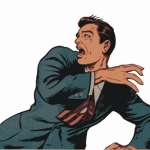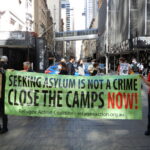Sexual Harassment Rife in Australian Workplaces

New research by the Human Rights Commission suggests that sexual harassment is on the rise in Australian workplaces.
The study, the fourth of its kind since 2012, found that one in three people reported being sexually harassed in the workplace, up from 21 per cent in 2012.
It also found that 71 percent reported being sexually harassed at some point in their lives, and that women are far more likely to experience sexual harassment than men – 85 percent versus 56 percent.
Young people were found to be at greatest risk in the workplace, with the figures suggesting that 45 per cent of people aged between 18 and 29 had been subjected to this kind of treatment.
Alarmingly, one in five 15 to 17 year olds reported experiencing sexual harassment at work.
While researchers concede the influx in reporting may partly be due to initiatives such as the #MeToo movement, there’s also a concern the figures don’t represent the full story, with many victims, particularly males, unlikely to report harassment for fear of being mocked or not believed, or the risk of facing reprisals from colleagues and damage to their careers.
What is sexual harassment?
The report identified the three most common forms of harassment as:
- Offensive, sexually suggestive comments or jokes,
- Inappropriate physical contact, and
- Unwelcome touching, hugging, cornering or kissing.
An industry breakdown found the ‘information, media and telecommunications’ industry to have drastically higher rates of harassment – 81% across both men and women. Industries which are male dominated such as mining, remained high risk workplaces for women.
The researchers found that workplace sexual harassment often goes unpunished because only 17 percent of people make formal reports or complaints to their employers, and 19 per cent of reported cases did not lead to any action being taken..
Two in three bystanders who witnessed a colleague being sexually harassed admitted they ‘did nothing’, believing that taking action could make it worse for the victim.
Ignoring the problem
Despite the fact that sexual harassment has been illegal for more than 25 years in Australia, there are growing concerns that action is rarely taken to address the issue.
Human resources personnel are often ill-equipped or unwilling to deal with complaints, especially when the reports are against staff in higher positions. They may also be unfamiliar with the proper way to deal with the issue. In one instance, a young woman who reported sexual harassment was asked what she was wearing at the time.
In many cases, the victims tolerate the conduct for a while, but later leave their jobs rather than report the conduct.
The conduct can have significant financial and mental repercussions on these people, while offenders escape the consequences.
Sexual harassment and the law
Sexual harassment is any unwanted or unwelcome sexual behaviour, which makes a person feel offended, humiliated or intimidated. Under the law, it is considered a type of discrimination under the Sex Discrimination Act, which makes sexual harassment unlawful in a range of circumstances.
Sexual harassment can in some circumstances form the basis of an apprehended personal violence order (APVO), or even amount to a criminal offence such as stalking or intimidating.
National inquiry
Community-wide concerns have triggered an independent national inquiry into sexual harassment, announced by Sex Discrimination Commissioner Kate Jenkins in June this year. The inquiry is believed to be a world first and will be conducted over 12 months.
Commissioner Jenkins said that many women and men have come forward to tell their stories of sexual harassment in the workplace, shining a light on this issue both in Australia, and around the world.







